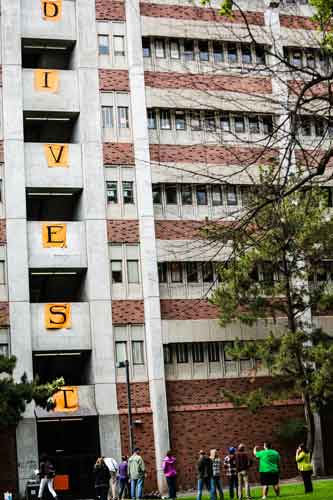
Students and faculty have been hearing about divestment since last year, and now it’s finally made the Associated Students spring ballot.
This year’s ballot measure asks students whether the A.S. should encourage the University Foundation to immediately cease all new investments in the largest 200 fossil fuel companies and fully divest all its holdings from these companies within the next four years.
The A.S. will draft a resolution to present to the foundation’s Board of Governors based on whether the majority of the student body votes “Yes” on the ballot, said A.S. President Taylor Herren.
However, if voted on, the passing of the ballot doesn’t ensure the foundation will divest.
“The A.S. doesn’t have any jurisdiction over that money,” Herren said. “The most we can do is put forth a well-written, meaningful action proposal and advocate for students, but it really falls on the foundation to make that decision.”
The Chico State University Foundation is a non-profit corporation separate from the university that handles campus donations, according to its bylaws. Donations are invested in various funds to promote campus education.
The interest made on these funds go toward services including student scholarships, which accounted for nearly 50 percent of the foundation’s $7 million in distributions last year, according to the foundation’s financial reports.
Of the $43.6 million of total investments, about 1.2 percent represents the fossil-fuel companies in question, according to the ballot’s impact statement.
Divestment could limit the foundation’s ability to make the most money, said Gary Salberg, the director of major gifts and planned giving.
Money in one investment, Vanguard 500, comprises about 80 percent of those funds in fossil fuel companies, he said. That investment returned 36 percent in gains last year.
“Finding an alternative fund that performs as well as that would be challenging,” Salberg said.
Pursuing divestment would also have implications for how the foundation works with its partners, he said. Some parties, including donors and investment managers, may choose to discontinue working with the university given the restrictions that social guidelines would put on the management of the foundation’s assets.
The foundation’s primary goal is to invest money responsibly based on the needs of the campus and donors, according to its bylaws.
“We are literally up against the mission of the foundation,” Herren said.
Students in the Environmental Thought and Action course petitioned to place the advisory measure on the spring election ballot.
The students want the foundation to build an “ethically sound” portfolio that doesn’t invest in fossil fuels, said Kevin Killion, a student in the class.
“We don’t think it’s right to profit from climate change,” he said.
University divestment is part of a global movement that has spread to more than 300 U.S. campuses , according to an environmental action group.
San Francisco State’s foundation is the only California State University committed to divestment. Other campuses throughout the nation like the University of Vermont, Columbia University and Stanford University have similarly implemented investment committees.
High voter turnout and a significant majority vote in favor of divestment could help the A.S. present a more convincing argument to the board, Herren said.
The challenge is that the advisory measure is “based on principle, not practicality,” given the interest of the board members, she said.
A.S. spring elections run from Tuesday to Thursday. Students can vote online at the A.S. website.
The Orion can be reached at reached at [email protected] or @theorion_news on Twitter.








